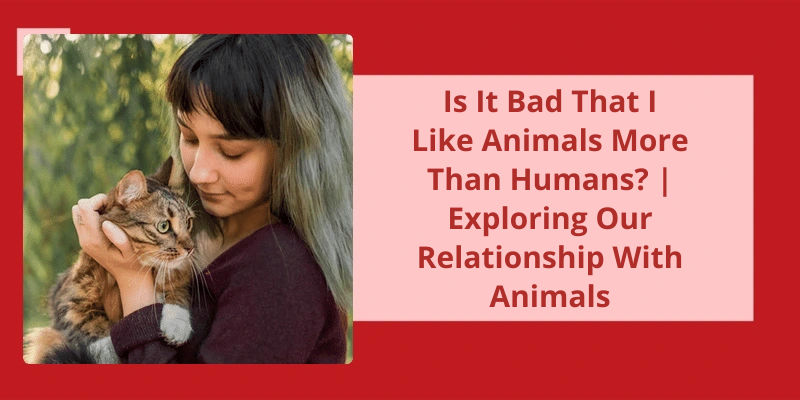As human beings, we’ve the ability to feel a wide range of emotions. Love, hatred, jealousy, anger, and happiness are just a few emotions that we experience on a daily basis. However, there's a growing trend among people who prefer the company of animals instead of that of other humans. Some people might be surprised by this, but as it turns out, humans have lived with animals for thousands of years, and the bond between animals and humans is incredibly strong. So, is it bad that some people like animals more than humans? The answer to this question isn’t as simple as yes or no. There are several factors that determine whether it’s bad or not, and it ultimately depends on the person.
Why Are Animals More Attracted to Me?
It means that you’ve a special aura that they can sense and are comfortable with. This aura could come from being confident, caring, and having a positive attitude towards animals. It’s important to remember that animals are very perceptive and can pick up on our moods, emotions, and intentions towards them.
Additionally, it could be due to how you present yourself physically. Animals are attracted to people who move in a calm and relaxed manner. When you approach them, speak in a soft and gentle tone, and make eye contact, they sense your energy and feel more at ease. Wearing neutral colors or earth tones can also help you blend in with the environment and make you appear less threatening.
Another factor that may contribute to animals being attracted to you is your level of experience handling them. If you’ve spent a lot of time around animals and know how to handle them properly, they’ll feel more comfortable around you. This could be because they sense that you aren’t going to harm them and that you know how to communicate with them effectively.
Finally, it’s important to remember that every animal is different and they may be drawn to different people for various reasons. For example, cats may be attracted to someone who’s calm and patient while dogs may be drawn to someone who’s more energetic and playful. It’s important to be open and receptive to each animals unique personality and communicate with them in a way that makes them feel comfortable.
It could be your energy level, how you present yourself physically, your experience handling animals, or even the specific animals personality. Regardless of the reason, it’s important to treat each animal with respect and kindness, and to be open and receptive to their needs. Remember, if animals are attracted to you, it’s a sign that you’re doing something right and should embrace this honor.
How to Safely Interact With Wild Animals Without Putting Either Yourself or the Animal in Danger
Interacting with wild animals can be risky for both the animal and you. However, there are ways to safely engage with wildlife with the intention of not putting anyone in danger. Before venturing out into the wilderness, you should familiarize yourself with the different animals and their habitats. When in close proximity to wildlife, keep a safe distance and avoid making any sudden movements or noises. It’s also important to avoid feeding wild animals, as this can disrupt their natural diet and behavior. Follow these tips for a safe and enjoyable interaction with nature’s creatures.
, we discussed the term “zoophilist” as a possible label for those who love animals more than humans. But what exactly does it mean to be a zoophilist? In this article, we’ll delve deeper into the term and explore it’s implications.
What Is It Called When You Love Animals?
, someone asked me if there was a word that described loving animals more than humans. Initially, I was taken aback and wasnt quite sure how to answer. However, upon some reflection and digging, I discovered that yes, there was such a word – zoophilist.
Zoophilist comes from the Greek words “zoo” meaning animal, and “philia” meaning love. Therefore, it’s a noun that describes someone who loves animals. Generally, zoophilists view animals as intelligent, emotional beings that should be treated with respect and kindness. They often advocate for animal rights and feel a deep connection to the animal kingdom.
While zoophiles often have pets themselves, they also care about the well-being of wild animals and may even participate in conservation efforts. Their love for animals can manifest in different ways – some may prefer the company of animals to humans, while others simply prioritize animal welfare in their daily lives.
It’s important to note that zoophilia isn’t the same thing as bestiality, which is a criminal act involving sexual activity with animals. In fact, the word zoophile previously had a different meaning- it referred to someone who’d an intense sexual attraction to animals. Nowadays, the term is generally avoided due to the connotations associated with it.
Overall, being a zoophilist can be a rewarding and fulfilling way of life, as it allows one to connect with the natural world on a deeper level and advocate for the creatures who share our earth. While some may find zoophilia strange or unusual, it’s important to remember that everyone has their own passions and interests – and for zoophilists, loving and caring for animals is at the forefront of theirs.
Psychological Benefits of Loving and Caring for Animals
Loving and caring for animals can have a positive impact on our psychological well-being. Studies have shown that spending time with pets can reduce stress, anxiety, and depression, as well as improve mood and overall happiness. The act of caring for another living being can also increase feelings of purpose and fulfillment, and promote social interaction and a sense of community among pet owners.
Source: People Who Love Animals More Than People – BetterHelp
It’s no secret that many people adore animals, often treating them like family members. But what does that say about their personality? Well, according to studies, animal lovers tend to exhibit a set of characteristics that make them great companions. From their kindness to their sense of responsibility, these traits can make for a strong foundation in any relationship. So, what exactly makes pet lovers such great people? Let’s take a closer look.
What Is the Personality of People Who Love Animals?
One of the defining traits of an animal lover is empathy. These individuals are often able to see the world through the eyes of other living creatures, and are willing to go to great lengths to ensure that they’re well-cared for. This kindness and concern for the well-being of others extends not only to animals but to people as well. Many animal lovers are involved in volunteer work or other forms of community service, making them valuable members of their communities.
Another common characteristic of animal lovers is a strong emotional connection with animals. Whether it’s a cat, a dog, or another type of animal, these individuals feel a deep bond with the creatures in their lives. This connection is often reciprocated, with the animals demonstrating a similarly strong attachment to their owners. This can create a powerful bond between people and animals that’s hard to replicate in other relationships.
Animal lovers are also typically responsible and dependable individuals. Taking care of an animal requires a significant amount of time, energy, and resources, and people who’re committed to doing so are often organized, reliable, and diligent. These individuals are often adept at balancing multiple responsibilities and are able to prioritize the needs of their pets alongside their own.
They’re sensitive to the needs of their animals and take great care to ensure that they’re well-fed, groomed, and loved. This attention to detail and desire to provide a nurturing environment extends to other areas of their lives, making them loving partners, parents, and friends.
The Psychological Benefits of Owning Pets for Animal Lovers.
Research has shown that owning pets can provide a multitude of psychological benefits for animal lovers. Pet ownership can promote feelings of companionship, reduce stress, alleviate feelings of anxiety and depression, increase social interaction and physical activity, and even improve self-esteem and confidence. These benefits are a result of the emotional support, unconditional love, and sense of purpose that pets provide to their owners.
While some people might argue that humans are inherently more valuable than animals, there are varying opinions on the matter. However, recent studies have shown a strong correlation between speciesism and a lack of consideration for animal welfare. In other words, those who view animals as less intelligent or capable of suffering are more likely to prioritize human interests over those of animals.
Why Do Humans Have More Value Than Animals?
As humans, we value ourselves and our own species above all others. This mindset has been ingrained in us for centuries, and it’s reflected in the way we treat animals and the environment. One reason many people believe that humans are more valuable than animals is simply because we’re humans. We’ve developed complex societies and technologies, and we can communicate with one another in ways that other animals cannot. This sense of superiority gives humans a sense of value and importance that animals don’t have.
Humans are capable of introspection and self-reflection, and we’re aware of our own mortality. This gives us a sense of purpose and meaning that animals don’t have. We can also make plans and think about the future, which is a level of cognitive ability that few animals possess.
We’re capable of reshaping our environment in ways that no other species can. We can build cities, dams, and highways, and we can create technologies that improve our lives. Our ability to innovate and adapt makes us incredibly valuable, both to ourselves and to the world around us.
At the same time, humans also have a responsibility to care for the animals and environment that share our world. Although we’re more advanced and complex than other species, we still rely on the natural world for our survival. We need clean air and water, healthy ecosystems, and sustainable food sources to thrive. This means we must value the lives and well-being of other creatures as well as our own.
The Ethical and Moral Implications of Valuing Humans Above Animals.
This topic explores the ethical and moral considerations of regarding human beings as more valuable than animals.
Conclusion
In the end, what matters most is that we treat both animals and humans with kindness, respect, and compassion. It’s natural to have preferences and affinities towards certain beings, but we must acknowledge that every living being deserves to be treated with dignity and empathy. Our love for animals shouldn’t come at the expense of neglecting or mistreating other humans. Rather, it should inspire us to become better people and to extend our circle of empathy to encompass all forms of life. Ultimately, whether we like animals more than humans or vice versa is a personal preference, but what truly matters is how we choose to act towards all living creatures.






